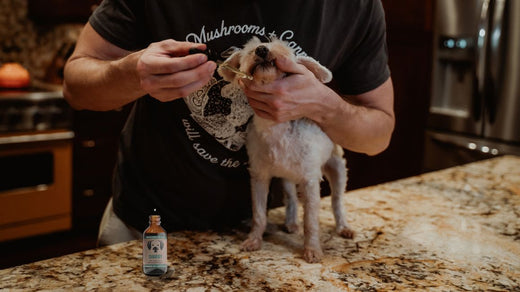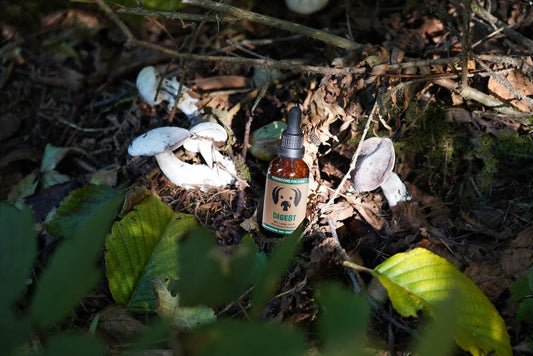Maintaining a healthy gut microbiome is crucial for dogs, especially with conditions like leaky gut in dogs becoming increasingly common. Leaky Gut Syndrome, often caused by poor diet, stress, or medication, can lead to a host of health issues, from digestive problems to inflammation. Fortunately, natural solutions like medicinal mushrooms and adaptogens can play a pivotal role in healing and restoring balance to the gut.
Understanding Leaky Gut in Dogs
Gut health is the cornerstone of overall well-being, and just like humans, dogs are also susceptible to digestive health issues. One of the most common conditions affecting dogs today is Leaky Gut Syndrome, a condition where the lining of the gut becomes compromised, allowing harmful substances to pass into the bloodstream.
As pet owners, understanding how to manage this condition naturally can help improve your dog’s health significantly. The solution to this common problem may be found in natural supplements, such as MycoDog's Digest, a powerful blend of medicinal mushrooms and adaptogens that support a balanced gut microbiome.
What is the Gut Microbiome?
Without getting too complex, the microbiome is the term used to describe our GI system and its microbial inhabitants. There are more bacterial cells in our gut than the sum of all the other cells in the body!
This is a cue as to how hugely important the microbiome is. Not only is our microbiome responsible for digesting food and giving us energy, but it’s also the central manufacturing location of almost all neurotransmitters (like serotonin and dopamine), controls our inflammatory response, and is the majority of our immune system.
Our microbiome is chiefly composed of commensal bacteria, which means that the bacteria in your dog’s gut are based on your dog’s primary diet. Things like fiber from fruits, berries, and vegetables nourish the beneficial bacteria in your pet’s gut. In return, these bacteria produce enzymes that aid in digesting food, as well as vitamins, amino acids, and short-chain fatty acids that support overall health.
The trillions of microbes within our gut must behave and communicate appropriately to maintain and regulate the body’s functions. When these microbes become imbalanced or damaged, problems will quickly arise.

What Is Leaky Gut Syndrome in Dogs?
Leaky Gut is a loose term used to describe various types of damage to the gut lining. The walls of our GI system are very thin and fragile. The cells that comprise our gut wall must stay closely connected to one another to maintain a proper barrier from food inside the gut and vice versa. When these cells become damaged, the junctions between them loosen.
This allows undigested food particles, bacteria, and toxins to enter the bloodstream, triggering a systemic inflammatory response. This causes all sorts of issues, and can lead to long-term health conditions, many of which go undiagnosed or misdiagnosed as allergies or IBD.
Symptoms of Leaky Gut in Dogs
Leaky Gut symptoms in dogs can be wide-ranging since the gut affects the body as a whole, but these are some of the more general symptoms and warning signs of a dog with leaky gut:
- Digestive irregularities like vomiting, diarrhea, constipation, colitis
- Weight loss
- Yeast infections
- Allergy-like symptoms
- Mood and behavior changes
- Liver, pancreas, gallbladder, or kidney problems
- Arthritis and joint problems
- Autoimmune diseases
- Thyroid disease
Of course, some of these symptoms of dog leaky gut can have no relation to the gut, but it’s highly likely that the gut always plays a role in just about any and every disease process. Inflammation is the critical factor in resolving leaky gut since inflammation is the root cause of almost every disease known to man.

Factors That Contribute to Leaky Gut in Dogs:
Leaky Gut Syndrome in dogs can be triggered by several factors that compromise the integrity of the gut lining. Common causes include a poor-quality diet, medications like antibiotics or NSAIDs, chronic stress, and lack of exercise. These factors can lead to an imbalance in the gut microbiome, weakening the gut barrier and allowing harmful substances to enter the bloodstream, which triggers inflammation and other health issues. Let’s take a closer look at the primary causes of leaky gut in dogs.

Poor Quality Diet: Too Much Sugar & Processed Food
This is the most common reason we see Leaky Gut in pets, as most are fed poor-quality diets like kibble. These diets have been studied and shown to increase inflammatory markers and loosen tight junctions within the gut.
Kibble raises the inflammatory marker known as homocysteine and is full of rancid fats mixed with waste-quality feed ingredients like corn, wheat, soy, peas, potatoes, and even worse- preservatives, additives, and dyes- all best suited for the landfill, not our pet’s bowls. Constant feeding of these diets will undoubtedly result in stress on all organs, especially the gut.
Commercial pet foods are typically cooked at extremely high temperatures, a process that destroys beneficial living organisms and enzymes. This loss of essential nutrients can compromise digestion and pets' overall health by reducing the bioavailability of essential vitamins, minerals, and probiotics.
In addition, the grains/carbs used in kibble are almost always LOADED with pesticides like glyphosate, a proven microbiome damager, not to mention the countless other toxic chemicals used in sourcing and manufacturing kibble.
Medications like Antibiotics, Steroids, and NSAIDs
Medications like antibiotics, steroids, and NSAIDS (carprofen, Duramax, meloxicam) all can have catastrophic effects on the gut microbiome and gut lining. This is why vomiting, diarrhea, and black/bloody stools are side effects all vets warn about when giving these meds and urge you to stop administration as soon as they erupt.
NSAIDs like Rimadyl and Durramax are prostaglandin inhibitors. Prostaglandins are hormone-like substances that are crucial in regulating several bodily functions. They are involved in the inflammatory response, help manage pain, control blood flow, influence the formation of blood clots, and induce uterine contractions during childbirth.
Additionally, prostaglandins contribute to the maintenance of the stomach lining and the functioning of the kidneys. So, when a medication like an NSAID inhibits them, this can negatively affect the gut since prostaglandins are crucial in maintaining the stomach lining.
Chronic use of these types of medications will undoubtedly damage the gut lining and should be avoided unless absolutely necessary.
Chronic Stress
Stress can significantly impact digestion. During intense stress, such as a fight-or-flight response, the body diverts energy away from the digestive system, slowing or even stopping digestion. Stress can increase gut barrier permeability and alter the gut microbiome by triggering a biochemical cascade.
For instance, under stress, certain bacteria like Lactobacillus may proliferate and produce indole-3-acetate (IAA), which can further influence gut health and function. Chronic stress can impair the function of intestinal stem cells, reducing their ability to regenerate the cells that protect the intestines from pathogens. This malfunction can compromise the integrity of the intestinal lining and increase infection vulnerability.
Stress can cause inflammation of the mucosal lining of the stomach and intestines. This inflammation can increase sensitivity and irritation from gastric juices, potentially causing discomfort and exacerbating digestive issues.
Lack of Exercise
A lack of exercise can cause the muscles in your gut to become less active, which may negatively affect the overall health and functionality of the digestive system. When these gut muscles are not adequately stimulated, it can lead to reduced motility and slower movement of food through the digestive tract.
Regular physical activity helps maintain the strength and coordination of gut muscles, promoting efficient digestion and supporting intestinal barrier integrity.
Diagnosing Leaky Gut in Dogs
Since Leaky Gut is a broad diagnosis, and since many conventional veterinarians are still just scratching the surface of their understanding of the importance of the gut microbiome, it may take a lot of work to get an accurate diagnosis.
Most conventional vets will label your dog as having allergies, IBD, anxiety, or a yeast infection instead of looking at the root cause. All the aforementioned conditions are simply terms used to describe a handful of symptoms, not understanding where said symptoms arose from. This is a classic problem in conventional medical fields- symptoms are given a “diagnosis” without any further questioning where these symptoms came from.
Since our pets can’t talk, a diagnosis is even more difficult. It’s unlikely a conventional or even a specialist at a conventional clinic will make a leaky gut diagnosis, so seeing a holistic veterinarian is crucial to getting an accurate diagnosis and treatment plan for leaky gut in dogs.
Microbiome (stool) and blood tests are good starts to confirm a diagnosis, complete medical history, and track symptoms.
Natural Remedies for Leaky Gut in Dogs
In addition to medicinal mushrooms, several natural remedies can help heal the gut lining and restore balance:

Humic and Fulvic Acid for Leaky Gut
My favorite supplement for actively healing and repairing the gut is Humic & Fulvic Acid. Humic acid is an organic compound formed from the decay of ancient plant material over millions of years through "humification." Fulvic acid, a byproduct of humic acid, originates from organic matter buried deep within the earth that has yet to transform into coal.
Humic acid conditions the soil, enhancing the plant's ability to absorb nutrients and minerals. In the body, humic acid is a cleansing, fortifying, and nourishing agent, promoting overall health by improving nutrient absorption and supporting detoxification processes.
Humic and fulvic acids improve immunity by restoring digestive health. Humic & Fulvic help microbial cells within the gut communicate more effectively and help to repair Leaky Gut actively. Fulvic acid is rich in electrolytes and enhances nutrient absorption, allowing ions to flow efficiently. Its small molecules facilitate oxygen and nutrient passage through cell membranes.
Humic and fulvic acids improve the absorption of supplements, making them more effective when taken together. Humic and fulvic acids enhance gut microbiome balance, increasing beneficial bacteria and alleviating symptoms like bloating, constipation, and diarrhea. This can help treat SIBO and IBD.
By decreasing chronic inflammation, humic and fulvic acids help relieve pain from conditions such as arthritis, headaches, and muscle pain. These acids aid in fighting bacterial and viral infections, including Candida, and can reduce the risk of viral overload when used preventatively. Supplementing with humic and fulvic acids can improve body pH levels, supporting normal cell metabolism and organ function.
Marshmallow Root for Leaky Gut
Marshmallow root is beneficial for leaky gut due to its high mucilage content, which coats and soothes the digestive tract, potentially reducing irritation and inflammation. It also possesses anti-inflammatory properties that can aid in healing the intestinal lining and improving gut barrier function.
Additionally, marshmallow root supports healthy mucous membranes throughout the body, which is crucial for effective digestion and nutrient absorption. It acts as a prebiotic, promoting the growth of beneficial gut bacteria, and its soothing effects may alleviate symptoms such as bloating, gas, and discomfort associated with leaky gut syndrome.
Deglycyrrhizinated Licorice for Leaky Gut
Deglycyrrhizinated licorice (DGL) offers significant benefits for leaky gut syndrome. It stimulates mucous production in the stomach lining, creating a protective barrier against stomach acid and enzymes, which helps soothe and safeguard the gut lining.
DGL's anti-inflammatory properties reduce inflammation in the gastrointestinal tract, aiding in the healing of the intestinal lining and improving gut barrier function. It supports gut healing by promoting the growth of intestinal cells and enhancing the secretion of protective substances.
Additionally, DGL exhibits antioxidant effects that neutralize free radicals and reduce oxidative stress in the gut, contributing to overall gut health. Its soothing effects on the digestive tract relieve symptoms like heartburn, bloating, and indigestion associated with leaky gut syndrome.
L-Glutamine
L-glutamine is critical in supporting gut health and addressing leaky gut syndrome. It serves as a primary fuel source for intestinal cells (enterocytes), aiding in their regeneration and maintenance of the intestinal barrier. This barrier acts as a protective filter, allowing nutrients to pass while blocking harmful substances from entering the bloodstream.
L-glutamine helps tighten junctions between intestinal cells, reducing intestinal permeability and enhancing the integrity of the gut barrier. Its anti-inflammatory properties also aid in reducing gut inflammation, which is often associated with leaky gut syndrome.
L-glutamine promotes proper immune function and helps maintain overall gut health by supporting gut barrier function and reducing inflammation. Its role as an energy source for enterocytes supports their growth and repair, which is crucial for the health of the intestinal lining and optimal gut function.
Hemp Oil
Hemp offers potential benefits for leaky gut syndrome through several mechanisms. It has well-documented anti-inflammatory effects, which can help reduce chronic inflammation often associated with gut disorders like leaky gut syndrome, potentially alleviating symptoms and promoting healing.
Hemp may influence the function of tight junctions between intestinal cells, which are crucial for maintaining the integrity of the gut barrier. By regulating gut permeability, it could help reduce the leakage of harmful substances through the intestinal lining that happens with leaky gut in dogs.
Additionally, hemp is known for its analgesic properties, which may provide relief from abdominal pain and discomfort experienced by individuals with leaky gut syndrome, thereby improving comfort and quality of life. Additionally, its anxiolytic effects can help manage stress. Chronic stress can exacerbate gut inflammation and contribute to digestive disorders.
Hemp Dog Health's EASE hemp oil for dogs, formulated with additional adaptogens, Frankincense and Turmeric, is our recommended hemp oil for leaky gut in dogs.
Medicinal Mushrooms for Leaky Gut in Dogs
Medicinal mushrooms offer a comprehensive approach to supporting gut health and addressing leaky gut syndrome in dogs.
Medicinal mushrooms for dogs with leaky gut contain compounds with potent anti-inflammatory effects that reduce gut inflammation and mitigate underlying causes of leaky gut. Additionally, they provide polysaccharides and bioactive compounds that support the integrity of the intestinal barrier, strengthening the gut lining and reducing permeability.
Certain mushrooms act as prebiotics, fostering the growth of beneficial gut bacteria crucial for maintaining a balanced gut microbiome and preventing gut-related conditions. Their immune-modulating properties help regulate immune responses in the gut, while antioxidant-rich content helps neutralize free radicals and reduce oxidative stress, supporting overall gut health and function.

Which Medicinal Mushrooms for Leaky Gut in Dogs?
Medicinal mushrooms offer a potent, natural way to support and restore gut health in dogs, especially for conditions like leaky gut syndrome. Each mushroom brings unique benefits to gut health, reducing inflammation, promoting healthy gut bacteria, and protecting the gut lining. Let’s dive into the specific properties of each mushroom included in MycoDog Digest that makes them so valuable for your dog’s gut health.
Shiitake (Lentinula edodes)
Shiitake mushrooms are powerful prebiotics, meaning they promote the growth of beneficial bacteria in the gut. They help increase short-chain fatty acid (SCFA)-producing bacteria and balance the ratio of Bacteroides to Firmicutes, two key groups of bacteria crucial to maintaining a healthy gut microbiome.
Research has shown that Shiitake can prevent and even reverse age-related declines in gut health by regulating microbiota balance.
Additionally, Shiitake has potent immune-modulating properties, helping to protect the gut from inflammation and promoting overall health. One study even found that Shiitake could mitigate long-term gut damage caused by dysbiosis during early life, further demonstrating its gut-healing potential.
Lion’s Mane (Hericium erinaceus)
Though known primarily for its cognitive benefits, Lion’s Mane plays an important role in supporting gut health as well. This mushroom strengthens the intestinal barrier and promotes a richer diversity of gut bacteria, crucial for a well-functioning microbiome.
Lion’s Mane is packed with antioxidants that neutralize free radicals, which can damage the gut lining. Its anti-inflammatory properties help soothe the gastrointestinal tract, reducing symptoms of inflammation that can exacerbate leaky gut in dogs.
By supporting gut lining integrity and balancing gut flora, Lion’s Mane helps maintain a healthy digestive system.
Chaga (Inonotus obliquus)
Chaga mushrooms are another excellent prebiotic, supporting the growth of beneficial gut bacteria such as Bacteroidetes, which play a key role in metabolizing complex carbohydrates and providing essential nutrients to the gut microbiome.
Chaga has long been used to treat bacterial and viral infections in the gut due to its immune-enhancing properties. Rich in antioxidants, Chaga also helps reduce inflammation and oxidative stress in the digestive tract, making it particularly beneficial for dogs suffering from conditions like Crohn’s disease, ulcerative colitis, or leaky gut syndrome.
Turkey Tail (Coriolus versicolor)
Turkey Tail mushrooms are renowned for their immune-boosting and cancer-fighting properties, but they also offer significant benefits for gut health. Turkey Tail contains beta-glucans, fructooligosaccharides (FOS), and polysaccharides, all of which act as prebiotics, promoting the growth of healthy gut flora. These compounds also support the immune system and protect the gut from oxidative stress.
Turkey Tail’s ability to increase gut flora diversity is particularly important, as a diverse microbiome is key to a balanced immune system and overall gut health. This mushroom is also packed with antioxidants, which protect the gut from damage caused by toxins and stress, helping to maintain gut integrity.
Red Belted Conk (Fomitopsis pinicola)
Red Belted Conk is a lesser-known but highly effective medicinal mushroom for gut health. It excels at reducing inflammation in the gastrointestinal tract, making it an excellent choice for dogs suffering from digestive issues like IBD or leaky gut.
This mushroom also supports immune function, promoting a balanced inflammatory response within the gut. Its antioxidant properties further protect the gut lining from oxidative damage, while it also helps regulate blood sugar levels, improve digestion, and enhance nutrient absorption.
By incorporating Red Belted Conk into your dog’s diet, you’re providing comprehensive support for a healthy gut microbiome and overall well-being.
Adaptogens: The Natural Stress Relievers for Gut Health
Adaptogens like Ashwagandha, Astragalus, and Rhodiola rosea work synergistically with medicinal mushrooms to combat the effects of stress, support immune function, and promote gut health. These herbs help regulate the body’s stress response, reduce cortisol levels, and ultimately help protect the gut lining from stress-induced damage.

Ashwagandha is well known for its stress-relieving properties. Chronic stress is a significant contributor to gut inflammation and damage, so reducing stress with adaptogens like Ashwagandha can prevent further deterioration of the gut lining.
Astragalus is a powerful herb that helps boost the immune system and improve gut function. By enhancing the body’s natural defense mechanisms, Astragalus supports gut health and aids in healing the damage caused by Leaky Gut Syndrome.
Rhodiola is particularly effective at reducing inflammation and oxidative stress, both of which can worsen leaky gut. By lowering inflammation, Rhodiola supports gut healing and helps restore balance to the digestive system.
Introducing MycoDog Digest: A Comprehensive Formula for Gut Health in Pets
Each of the medicinal mushrooms and adaptogens above contributes to a balanced and resilient digestive system, addressing the root causes of leaky gut in dogs by reducing inflammation, supporting healthy gut bacteria, and protecting the gut lining. When combined, these mushrooms & adaptogens form a powerful natural remedy for improving gut health in dogs, which is exactly what MycoDog Digest offers.

MycoDog Digest combines the gut-healing power of medicinal mushrooms like Shiitake, Lion’s Mane, Chaga, Turkey Tail, and Red Belted Conk with adaptogenic herbs like Ashwagandha, Astragalus, and Rhodiola rosea.
This unique mushroom extract & adaptogen blend is specifically designed to address gut health concerns such as Leaky Gut Syndrome, IBD, and microbiome imbalances in dogs.
- Supports digestion by enhancing enzyme production and nutrient absorption.
- Reduces inflammation in the gut, alleviating symptoms of leaky gut.
- Balances the gut microbiome by promoting the growth of beneficial bacteria.
- Protects and regenerates the gut lining through powerful anti-inflammatory and antioxidant properties.
Conclusion: Supporting Gut Health for a Happier, Healthier Dog
Our pets' microbiome plays a pivotal role in their overall health. Leaky Gut Syndrome, often caused by poor diet, medications, and stress, can compromise the gut’s integrity, allowing harmful substances to enter the bloodstream and trigger inflammation.
Fortunately, natural remedies like medicinal mushrooms, natural herbs, and adaptogens provide anti-inflammatory, gut-soothing, and immune-modulating benefits to heal the gut lining and reduce inflammation. By addressing the root causes of leaky gut in dogs and focusing on gut health, we can help repair and restore our pets' digestive systems, ensuring they live long, healthy, and happy lives.
About Krysta Fox

She has also previously taken on several roles within the industry, including the formulation, manufacture, and sales of raw pet food as well as consulting on animal health and nutrition. With her combined veterinary and pet industry knowledge, she can effectively help almost anyone she comes across in some way regarding their pets’ health. When she’s not working to help educate pet parents, she enjoys horseback riding and spending time with her husband, family, and friends.




